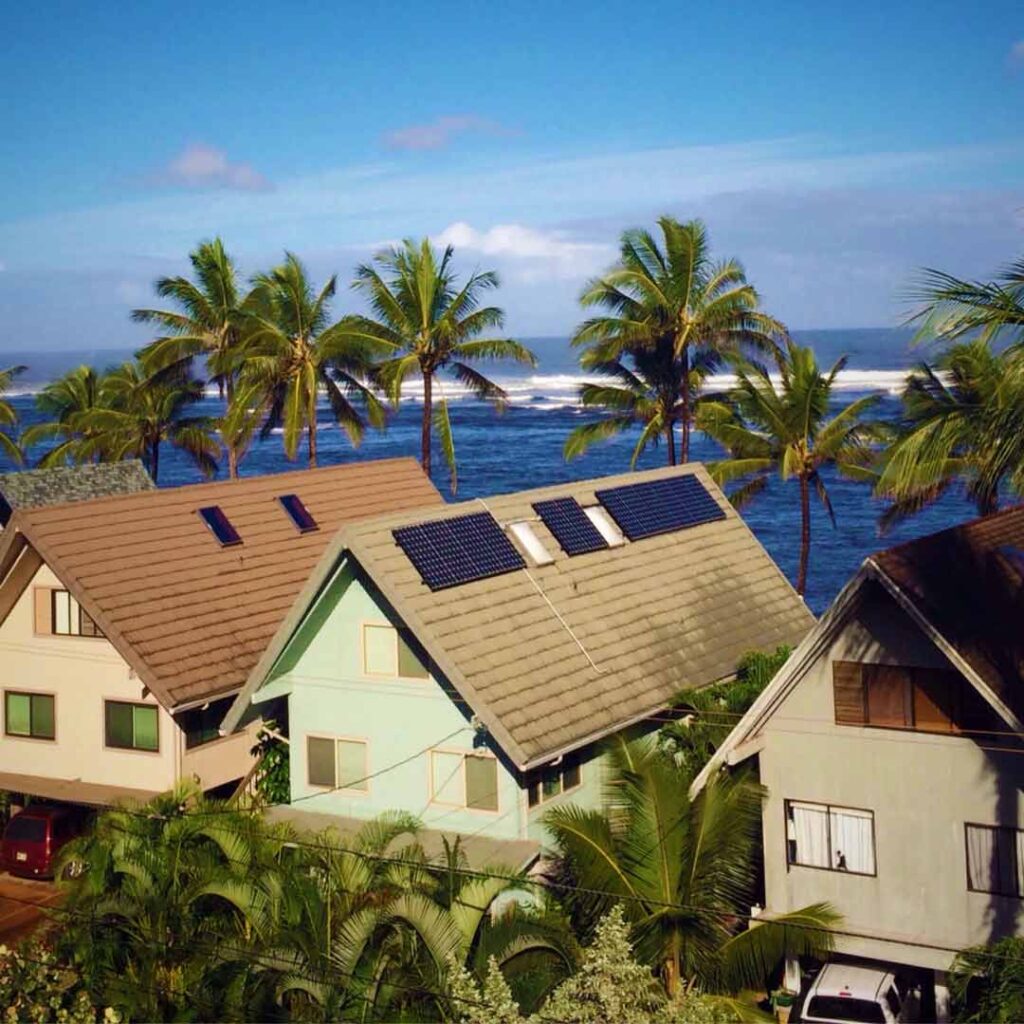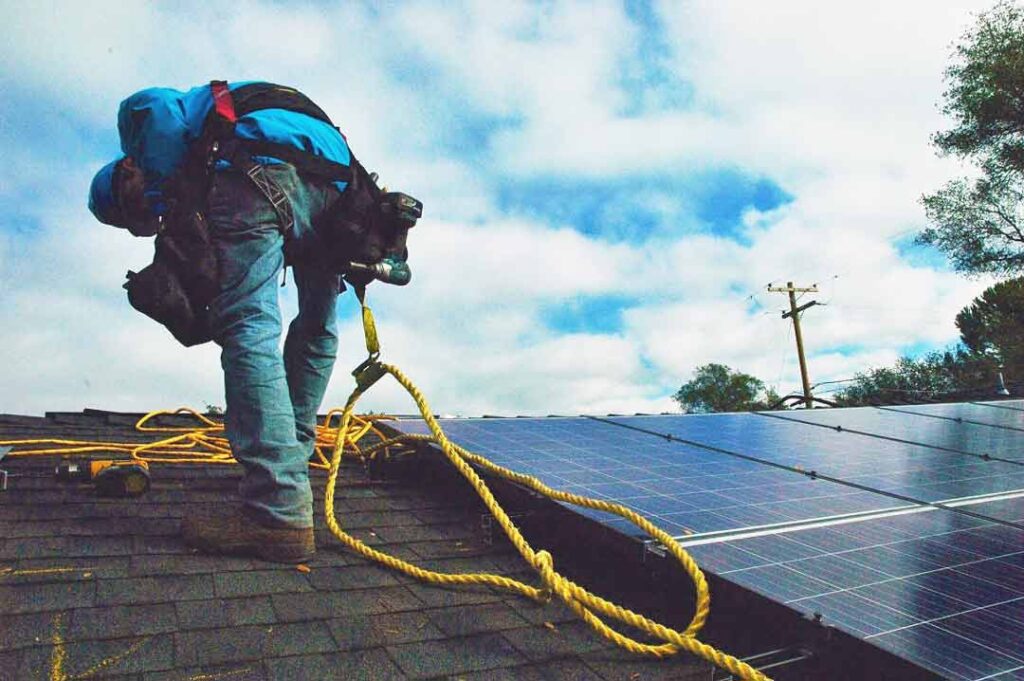There is a lot of talk about solar panels lately. More and more people are considering adding solar to their homes, but there are still some misconceptions about solar. In this article, we will answer some of the most common questions about solar panels. We will discuss the pros and cons of solar, and help you decide if solar is right for you!
Should I get solar panels?
When it comes to solar panel systems, salespeople can sometimes be less than honest about their benefits and drawbacks. As an insurance agency who helps Florida homeowners with home insurance, we have seen many customers who come to us confused and frustrated by misinformation presented to them.
These salespeople tend to blur the lines when it comes to what is true or false when it comes to solar panels and homeowners insurance. You’ll want to make sure to ask them about the issues raised in this article.
They may claim, for example, that solar panels will dramatically decrease a home’s insurance premiums. Or they may claim that they are fully compatible with any existing homeowners insurance policy.
In reality, however, solar panels can pose some challenges for home insurance coverage, and solar salespeople often downplay these challenges in order to encourage potential customers to purchase their products.
If you are considering solar panels for your home, it is important to do your research and consult with an expert in order to get the full picture of what solar panels can offer you.
Don’t get us wrong: installing a solar system may make sense for some people, but it’s not a one-size-fits-all solution. In this article, we’ll help you understand the solar panel pros and cons so that you can make an informed decision about whether or not solar is right for your home.
Know that you most likely will not be 100% solar.
According to the Qualitative Reasoning Group of Northwestern University, the majority of solar panels installed on residences only convert 14% of their potential energy into electricity. Even today’s most efficient solar panels convert just 22% of their available energy into power.
Solar cells will never achieve 100% efficiency. The highest theoretical attainable efficiency is 85%, and it’s aided by mirrors and motors to follow the sun.
A system that does not track the sun has a theoretical maximum efficiency of 55%, but remember that this is theoretical and doesn’t reflect actual efficiency. Systems that track the sun on overcast days have a similar limitation.
So, if spending thousands of dollars on system that is only about 15-20% energy efficient sounds good to you, then go ahead and spend the money!
Is there any downside of solar panels?
The biggest disadvantage of solar power is that it depends on the sun, and energy cannot be produced at night, necessitating the use of either storage or another source of electricity such as the local utility grid.
This implies you’ll have to spend more money for your solar panels in addition to their high price.
Clouds and thunderstorms, on the other hand, limit your solar energy production by blocking incoming light rays that would have been absorbed by the panel.
If you’re concerned about “Green Energy” & “Sustainability”…
A lot of people who advocate for solar panels will highlight how “green”, “clean”, and “sustainable” these systems are.
The problem is that there is a high amount of non-green, non-clean, and non-sustainable oils, fuels, and resources that are used in the construction and installation of these systems that calls into question whether they’re worthwhile from an environmental perspective in the first place.
Pollution & Environmental Impact
Solar power has several drawbacks, including land and water use and pollution.
Solar panels, like many other energy sources, require the usage of highly hazardous materials during production and have a detrimental impact on animal habitats.
When it comes to land use, solar farms may have a huge impact on the environment because of their sheer size. The fields require a lot of land which causes loss of habitat for wildlife.
Unlike wind energy (which has its own issues), sharing the land for agricultural uses is not an option when it comes to solar power. When it comes to mining and manufacturing materials required for photovoltaics, solar energy has an effect on land usage.
Among the compounds found in solar panels is cadmium and lead, extremely toxic metals.
In the United States, manufacturers are required by law to recycle these high-value chemicals rather than dispose of them. In countries like China, Malaysia, the Philippines, and Taiwan, where approximately half of photovoltaics are produced, however, these dangerous materials are being carelessly tossed in fields polluting the air, water, and soil.
Are solar panels worth it?
How much do solar panels cost in Florida?
According to the most recent Solar Market Insight Report from the SEIA, solar home systems currently cost an average of $3.03 per watt in the United States.
However, based on market study and data from top firms, we’ve discovered that solar panel prices in Florida are typically $2.53 per watt.
In other words, solar panel system costs are 16% less in Florida than the national average.
According to this projection, the typical cost of a 5-kW home solar system in Florida is $12,650. However, when you deduct the 26% federal tax credit, the system price drops to $9,361. The following table summarizes the average costs of popular system sizes in Florida before and after taking into account this national tax credit
| Size of Solar Panel System | FL Solar Panel Cost | Cost After Federal Tax Credit |
|---|---|---|
| 5kW | $12,650 | $9,361 |
| 6kW | $15,180 | $11,233 |
| 7kW | $17,710 | $13,105 |
| 8kW | $20,240 | $14,978 |
| 9kW | $22,770 | $16,850 |
| 10kW | $25,300 | $18,722 |
Does solar increase home value?
Solar panels are one of those things that we all want to believe will increase the value of our homes. After all, they save homeowners a lot of money, don’t they?
Well that depends.

According to the National Renewable Energy Laboratory, a study conducted by the Appraisal Journal revealed that every $1 reduction in annual utility expenses raises home value by $20. In other words, if you save $400 each year on your energy bill using solar energy, your property will be worth $8,000 more.
Solar can be valuable investment for future buyers when it’s been recently installed and when you’re living in a location where it’s becoming the norm.
If you live in an area with a lot of solar panel installations and purchasers are learning to anticipate them, adding them to your property may provide you something extra to advertise it when it comes time to sell. However, if few homes have solar panels and buyers are unwilling or unable to pay for the investment, you won’t get your money back.
Another point to consider is whether your house has characteristics that result in high electricity expenses. Solar may be a way to assist you reduce these costs if, for example, you operate a heated inground pool every summer (or all year).
Will solar panels ruin my roof?
For the most part, solar panels should not harm the outside or infrastructure of your roof if they are properly installed.

If you choose to work with a professional who is licensed and insured, your solar panels will have no effect on the integrity of your roof.
Installers will drill holes into the roof to secure and hang solar panels after they’ve been put in place. These big holes are for lag bolts, which are designed to keep solar panels in position and resist the elements for a long period of time.
Although it may be scary to see someone drilling holes in your home, this is a necessary step in order to install solar panels. The panels need to be securely attached to your roof, and this is the best way to do it.
Will my homeowners insurance go up if I get solar panels?
The short answer is: probably, but maybe not…
After putting solar panels on your roof, you might see an increase in your homeowners insurance premium, but this is because you’ll almost certainly be required to raise your coverage amounts to account for the cost of replacing your solar cells, which will result in a rise in your premium.
One of the things that solar panels salespeople erroneously tell their prospects is that solar panels will not cause their homeowners insurance to rise.
This is simply not true if you have to raise the dwelling coverage on your home.
This makes sense because solar panels are a valuable addition to your home, and you want to make sure they are properly protected in the event of any damage.
Fortunately, solar panels are typically very durable and can withstand high winds, hail, and other severe weather conditions.
Do solar panels need to be added insurance?
Solar panel insurance is covered by most homeowners insurance, so you won’t need anything additional.
Solar energy systems and rooftop panels or tiles are often seen as a permanent attachment to your home, like a patio or a security system.
As a result, solar panels are typically included in standard homeowners insurance policies. You may see a slight increase in your premium after adding solar panels to your home.
In conclusion
Adding solar panels to your home can be a valuable investment, both in terms of the money you save on energy costs and in terms of the increase in your home’s value. Solar panels are becoming increasingly common, so if you’re thinking of selling your house in the future, having solar installed may give you an edge over the competition. However, it’s important to do your research before making a decision, as solar isn’t right for everyone. Talk to professionals about whether solar is a good fit for your property and make sure to compare quotes from different installers before making a final decision.








